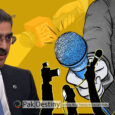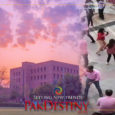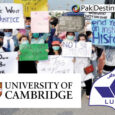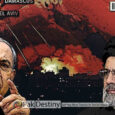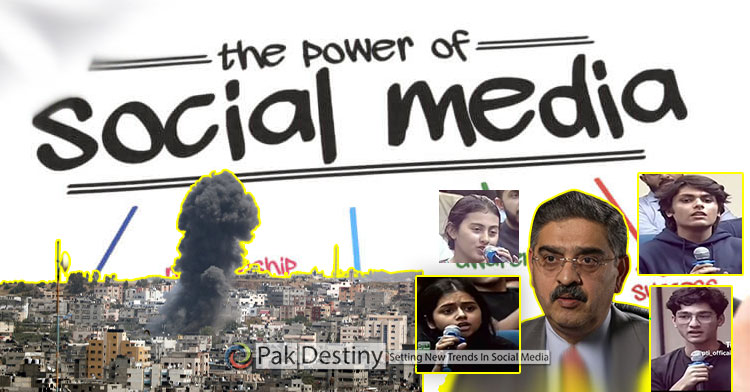
By Irum Saleem
Power of social media is being felt all around the world and Pakistan is no exception.
LUMS has been talk of the town for the last two days for its students grilling questions to PM Kakar forcing the conventional media to get influenced.
Israel-Hamas war dominated the cyber space and thiscontinues to occupy centre stage in global politics. Every headline and news story, every discussion is about it.
“Even in an insular society such as ours where we continue to be consumed by questions about elections, whether they will happen or not, or whether or not Nawaz Sharif will be prime minister, the Israeli-Palestinian conflict crops up inevitably. It has penetrated even the naval gazing which passes for political discussions in Pakistan,” says senior journalist and anchor Arifa Noor.
ان صحافتی گدھوں کو آج کے بچوں سے تھوڑا ایمانداری اور سچائی کا سبق لینا چائیے #سانحہ_لمز #LUMS pic.twitter.com/lfurAs6iNK
— Hanif Saeed 🇵🇰 (@haneefsaeed) October 31, 2023
چیئرمین پی ٹی آئی کی اسلام آباد پولیس کے افسر کے ساتھ بکتر بند گاڑی میں کھنچوائی گئی تصویر سامنے آگئی
— Shakir Abbasi (@ShakirAbbasi22) October 31, 2023
اسلام آباد پولیس افسر نے چیئرمین پی ٹی آئی کے ساتھ اٹک جیل سے اڈیالہ منتقلی کے وقت تصویر کھنچوائی ۔#سانحہ_لمز 😁 pic.twitter.com/QYqyzLJ5eW
We condemn the the #LUMS incident happened with caretaker prime minister Anwar-ul-Haq Kakar.Just condemning it for fun hahaha.#سانحہ_لمز pic.twitter.com/bBOzUWA2vZ
— Matin Khan (@matincantweet) October 31, 2023
Morals of the Story#سانحۂ_لمز:
— Lubna Raja (@LubnaOc) October 31, 2023
1-Don’t let yourself b @ the mercy of such a #WellInformed youth of today’s🇵🇰when u lack THAT charisma, popularity & intellect.
2-Keep yr mouth as zipped-up & words as calculated as possible when u r in such a deep Sh..💩 #وہ_آیا_وہ_چھا_گیا #LUMS pic.twitter.com/yRpDxkln5U
Exactly 💯💯#سانحہ_لمز pic.twitter.com/J9mQBJQ1Ke
— Sara Khan (@sarakhanofgmai1) October 31, 2023
She further says why haven’t you written about the war, I have been asked many times in these past weeks. Because I don’t feel equipped enough, is the embarrassed admission — rarely made publicly. Journalists, after all, should have mastery over a wide range of subjects — mastery enough to churn out a thousand words of wisdom. Perhaps, if I keep at this business of op-ed writing, in another decade or so, I may just get there.
“But I digress. Over the weeks, I have found it increasingly difficult to read the Western publications which have been part of the morning routine for long. Frankly, the coverage was too biased or didn’t cater to my bias.
It was this gap which was addressed by the polarising social media; it provided a different view. A view perhaps that I was searching for. But while looking for the voices of Palestinians or Gazans, there were also images, unfiltered, and un-editorialised, which were riveting.”
Noor says it is hard to remember the last time a conflict, even in the Middle East, played out in such detail on social media; and there have been many in recent times. Yemen is an example; it passed perhaps unnoticed here, expect for a few headlines.
For obvious reasons, Palestine resonates more globally including in Pakistan. This time around, though, the coverage or attention it has garnered through social media appears unprecedented.
The visuals of destroyed buildings, the rescues as people are pulled out from beneath the rubble, men, women and children mourning their killed loved ones dominate timelines. The moment a journalist learns of his family being killed in a bombing or doctors holding a press conference in the middle of bodies or a child screaming in fear are being shared on platform after platform.
“And the impact this will have on Muslim societies, the world over, may be worth keeping an eye on. This includes not just Muslim-majority countries but also those settled in the West. The huge protests in many Western cities are simply one indication of this, as are the small stories about Muslims being attacked or Jewish people being taken hostage.
But as a journalist, what is more thought-provoking is the use of social media by a side which feels its voice or version of the story is not heard or represented well enough in the powerful mainstream media. Or should it be the mainstream media of the powerful? However, now social media, with all its limitations, allows the voices, the stories and the images to be amplified.”
And perhaps this is one reason, in recent weeks, people have spoken of the polarisation on social media as well as the incorrect information being spread by all sides. Words which are so familiar to someone who is constantly grappling with similar issues in Pakistan.
“While these critiques are not incorrect, the larger point is that polarisation is perhaps inevitable when the dominant narrative (regardless of its accuracy or fairness) is challenged. For the real challenge comes from those who are not yet part of the system and hence don’t play by its rules. Those rules may vary from society to society and press to press but they exist. However, they exist for those within the tent. And what is difficult for those inside to understand is that those outside have no reason to follow those rules,” Noor says.
It is perhaps important here to remember earlier examples when the dominant account was challenged, due to new technologies. The printing press was the first such example. It led to not just the first bible but also Martin Luther, who questioned the church.
At the same time, say historians, it provided a voice to all those who had been silenced earlier, including the more radical and fringe groups. Exactly when it became clear that Luther was not just a radical, fringe writer is something researchers would know more about.
The reaction back then was also to censor but it proved impossible to reverse the clock; apparently however hard one tries to burn all the copies of an unsuitable book, an odd copy here or there tends to survive. And because it has been censored, it’s a book people are interested in reading and there is also a bookseller who is willing to take a risk because he wants to make a profit.
There are more recent examples, which journalists of today are more familiar with. Consider the impact CNN and then Al Jazeera had on the world in terms of politics and reporting. Television in general was derided in the beginning as a medium which would force politicians to make hasty decisions and this is more or less what the CNN effect was described as.
Al Jazeera perhaps took the world closer to what social media is doing now, in terms of ending the long-established rule of how information flew from the West to the rest of the world.
“Social media has taken this further. And as in the past, it is matched by an effort to control the challenge; ‘shadowbanning’ is a word being used frequently these days.
How far these efforts to control the spread of information will succeed is hard to tell. But it will eventually fail, if history is any guide. The, polarisation, however can be curbed to an extent if some of the voices are engaged with and brought into the tent, so to speak. But this is not easy to achieve, when the instinctive reaction is to simply silence,” Noor writes. PAK DESTINY

